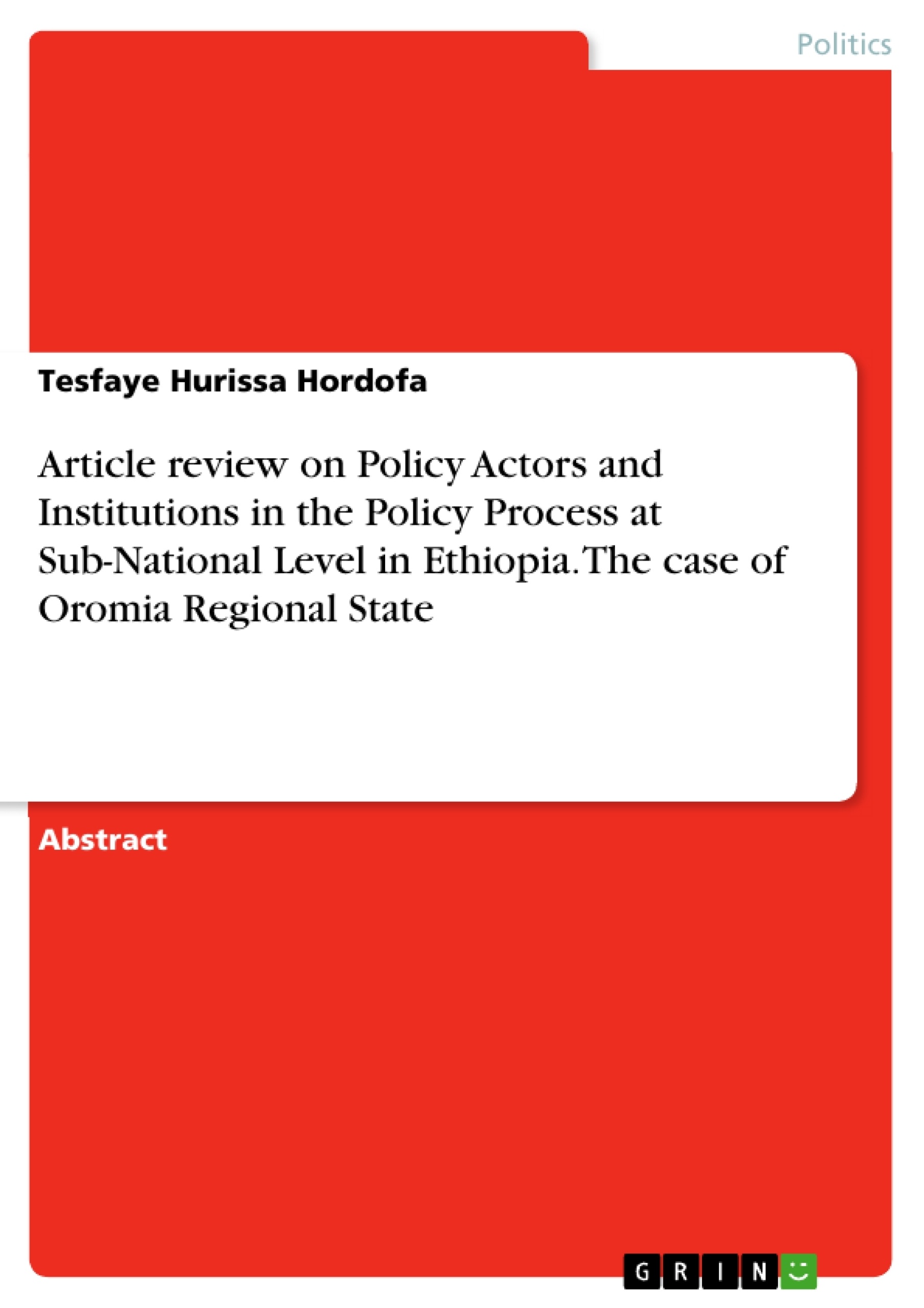The article "Policy Actors and Implementation Challenges in Oromia, Ethiopia" published in the Journal of Sustainable Development Africa 2020, focuses on the study of policy actors involved in the implementation of the Ethiopian government's policies in the Oromia region.
The study shows non-state policy actors do not actively participate in the policy making process in the regional state as the political space is limited while the participation of the ruling party, the executive and the federal government is high and influence the process of policy making in the state. The ruling party had monopoly on policy agenda setting in the regional state. The top level of government is controlled by a group of elites from the same party, which also restricts the participation of other actors.
Inhaltsverzeichnis (Table of Contents)
- Introduction:
- Explain briefly the Focus/Objective: the article
- Make a Discussion as related to
- Author's view:
- Other scholarly views:
- My position:
- Summary:
- Conclude
- Relevance to Ethiopian situation:
- REFERENCES.
Zielsetzung und Themenschwerpunkte (Objectives and Key Themes)
The article aims to analyze the role of policy actors in the implementation of Ethiopian government policies within the Oromia region, focusing on the challenges and limitations present in the policymaking process at the sub-national level. It delves into the impact of these limitations on sustainable development in the region.
- Role of policy actors in the implementation of government policies in Oromia.
- Challenges and limitations in the policymaking process at the sub-national level.
- The influence of political power structures on policymaking and implementation.
- Impact of limited participation of non-state actors on the effectiveness of policy implementation.
- The role of the ruling party and its dominance in shaping the policy agenda in the region.
Zusammenfassung der Kapitel (Chapter Summaries)
- Introduction: The article introduces the focus on policy actors involved in the implementation of Ethiopian government policies in the Oromia region. It highlights the limited participation of non-state actors due to restricted political space, while emphasizing the dominance of the ruling party and the executive branch in the policymaking process.
- Explain briefly the Focus/Objective: the article: This section clarifies the main objective of the article, which is to shed light on the role of policy actors in ensuring successful implementation of government policies in Oromia, a crucial aspect for achieving sustainable development in the region.
- Make a Discussion as related to: This section delves into a discussion about the author's view on policy implementation, emphasizing the need for involvement of diverse actors, including government officials, civil society, the private sector, and citizens. It also explores other scholarly perspectives on policy implementation, including differing views on the role of the government in ensuring successful outcomes. The section provides different interpretations of "policy" and its encompassing elements, analyzing the concept from various perspectives.
Schlüsselwörter (Keywords)
The primary focus of the article centers on policy actors, policymaking processes, and implementation challenges within the Oromia region of Ethiopia. The text emphasizes the role of government policies and the limitations of participation by non-state actors in the sub-national level. It further explores themes related to sustainable development, political influence, and the impact of power structures on policy effectiveness.
Frequently Asked Questions
What is the main challenge for policy implementation in Oromia, Ethiopia?
The main challenges are limited political space for non-state actors and the dominance of the ruling party in the policymaking process.
Who are the primary policy actors in the regional state?
The primary actors are the ruling party, the executive branch, and the federal government, who heavily influence the agenda.
How does limited participation affect sustainable development?
Without the involvement of civil society and the private sector, policies may lack local relevance and effectiveness, hindering development.
What role does the "elite" play in Ethiopian policymaking?
A group of elites from the same party often controls the top levels of government, restricting diverse perspectives in the policy process.
What is the importance of non-state policy actors?
Non-state actors like NGOs and citizens provide essential feedback and resources that are crucial for the successful implementation of policies.
- Quote paper
- Tesfaye Hurissa Hordofa (Author), 2023, Article review on Policy Actors and Institutions in the Policy Process at Sub-National Level in Ethiopia. The case of Oromia Regional State, Munich, GRIN Verlag, https://www.grin.com/document/1354858



